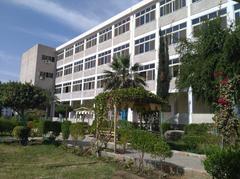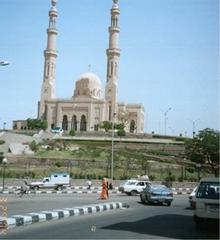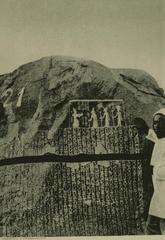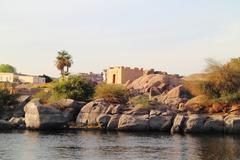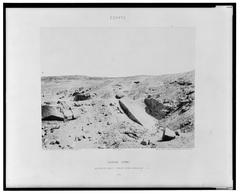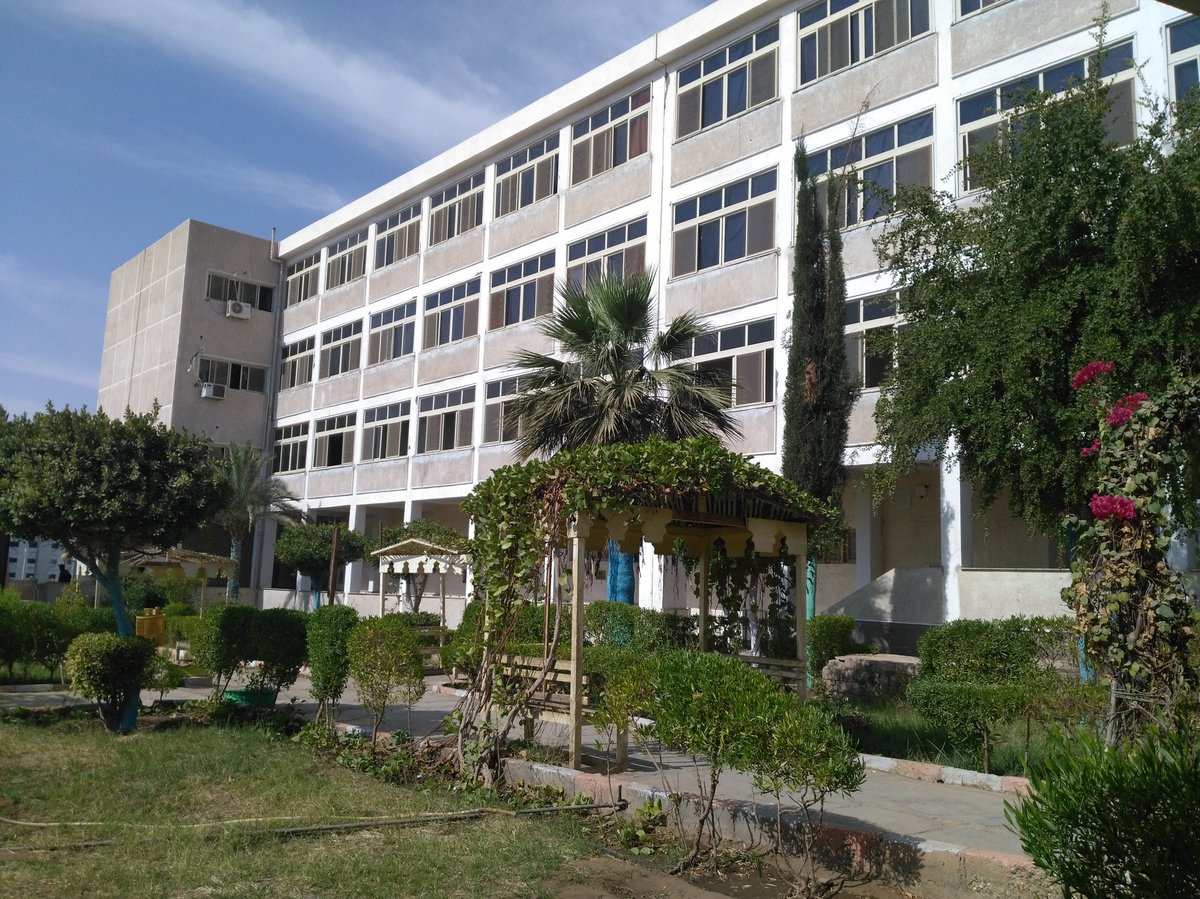
Complete Guide to Aswan University Visiting Hours, Tickets, and Nearby Attractions in Aswan
Date: 14/06/2025
Introduction to Aswan University and Its Significance
Aswan University, situated in the vibrant and historically significant city of Aswan in southern Egypt, stands as a dynamic center of academic excellence and sustainable development. Since its independence in 2012, the university has rapidly emerged as a leading institution, enrolling over 31,000 students across a range of faculties such as Humanities, Sciences, Engineering, Medicine, Agriculture, and Social Sciences. It is recognized both nationally and internationally for its pioneering research—particularly in sustainable energy solutions, like solar power—aligning with Egypt’s Vision 2030 and the United Nations Sustainable Development Goals (SDGs).
A visit to Aswan University provides more than just an academic tour; it offers a firsthand look at Egypt’s progressive approach to sustainability and community outreach. Visitors can explore the campus’s green infrastructure, innovative research centers, and participate in cultural and educational events that underscore the university’s impact on regional development. The university’s strategic location also places guests within easy reach of Aswan’s celebrated historic sites, offering a unique blend of contemporary academic innovation and ancient cultural heritage.
This comprehensive guide compiles essential information for visitors, including campus tours, sustainability initiatives, and detailed insights into nearby attractions such as the Unfinished Obelisk, Archangel Michael’s Coptic Cathedral, and the Monastery of St. Simeon. Practical travel tips, accessibility information, and answers to frequently asked questions ensure a well-prepared and enriching visit to both the university and the wider Aswan area.
For additional information, consult the Aswan University Official website.
Contents Overview
- Introduction to Aswan University
- History and Academic Profile
- Visiting Aswan University: Campus Tours and Events
- Sustainability Initiatives and Community Engagement
- Nearby Historical Sites and Visitor Information
- The Unfinished Obelisk
- Archangel Michael’s Coptic Cathedral
- Monastery of St. Simeon
- Travel Tips and Accessibility
- Regional and International Collaborations
- Frequently Asked Questions (FAQ)
- Conclusion
Visiting the Aswan High Dam: Hours, Tickets, and Travel Guide
Introduction to the Aswan High Dam
The Aswan High Dam, located near Aswan city, is among the 20th century’s most impressive engineering feats. Built between 1960 and 1970, the dam fundamentally reshaped Egypt’s landscape by controlling the Nile’s floods, generating hydroelectric power, and securing water supplies for millions. Visitors to Aswan can tour the dam to understand its historical, cultural, and economic importance.
History and Cultural Impact
Constructed to replace the earlier Aswan Low Dam, the High Dam addressed the persistent issues of flooding and drought that plagued Egyptian agriculture. The dam is symbolic of Egypt’s modernization under President Gamal Abdel Nasser, and its construction led to major preservation efforts, notably the UNESCO-facilitated relocation of the Abu Simbel temples, which were threatened by the creation of Lake Nasser.
Visiting Hours and Ticket Information
- Hours: Open daily, 8:00 AM – 4:00 PM
- Tickets: Adults ~60 EGP, with discounts for children and students (verify current pricing before your visit)
- Guided Tours: Available through local operators and on-site, offering deeper access and historical context
Getting There
The dam is about 15 kilometers from Aswan’s city center. Travel by taxi, private car, or organized tour bus takes around 20 minutes and provides scenic views of the Nile and the desert.
Nearby Attractions
- Nubian Museum: A showcase of Nubian heritage in Aswan city
- Philae Temple: Ancient temple complex on Agilkia Island, accessible by boat
- Lake Nasser Cruises: Cruises offer unique perspectives of the dam and surrounding landscapes
Accessibility and Visitor Tips
- The site is wheelchair accessible, but some areas may have uneven ground
- Comfortable shoes and sun protection are highly recommended
- Photography is permitted, though some restrictions apply in control areas
- The best visiting period is from October to April due to cooler temperatures
Special Events
Occasional exhibitions and cultural events at the dam celebrate Egypt’s engineering achievements. Check local listings or the official site for updates.
FAQs
Can I enter the control rooms of the Aswan High Dam?
Access is usually restricted but may be included in specialized guided tours.
Is there an entry fee for children?
Children often receive discounts or free admission, depending on age.
What is the best time to visit?
Mornings are best to avoid heat and crowds.
Are there safety concerns?
The site is well-maintained; follow posted guidelines for safety.
Conclusion
The Aswan High Dam is both a critical infrastructure project and a historical monument. Whether you are passionate about engineering, history, or culture, a visit offers educational and memorable insights.
Discover Aswan University: Academic Excellence and Regional Heritage
History and Academic Profile
Founded as a branch of Assiut University in 1973, later affiliated with South Valley University, Aswan University became independent in 2012. It now encompasses faculties in a broad array of disciplines and boasts more than 8,700 academic publications and 104,000 citations. Its Faculty of Energy Engineering is particularly influential in advancing solar energy research, underscoring its alignment with Egypt’s climate and sustainability initiatives.
Visiting Aswan University: Campus Tours and Events
Guided tours can be arranged by contacting the university’s visitor services. Highlights include visits to sustainable infrastructure, research laboratories, and community engagement projects. The campus welcomes visitors from Monday to Friday, 9:00 AM to 4:00 PM. Admission is free, but group bookings should be made in advance. Public exhibitions and cultural events, including sustainability workshops and archaeology lectures, are held year-round.
Sustainability Initiatives and Community Engagement
Aswan University is a national leader in sustainability, with initiatives that include:
- Solar panels and wind turbines for energy efficiency
- Promoting public transit and cycling
- Green building standards for new facilities
Outreach activities include tree-planting, waste reduction, and biodiversity conservation, such as the preservation of the Doum Palm. The university’s efforts are recognized in international sustainability reports.
Nearby Historical Sites and Visitor Information
The Unfinished Obelisk
- Hours: 8:00 AM – 5:00 PM
- Tickets: 60 EGP/adult, 30 EGP/student
- Highlights: Ancient granite monument illustrating stone-working techniques
Archangel Michael’s Coptic Cathedral
- Hours: 9:00 AM – 1:00 PM; 4:00 PM – 7:00 PM
- Admission: Free
Monastery of St. Simeon
- Hours: 8:00 AM – 4:30 PM
- Tickets: 50 EGP
Wear comfortable shoes and bring water, especially for outdoor sites.
Travel Tips and Accessibility
The university is accessible from Aswan International Airport and by local transport. The campus and major attractions accommodate visitors with mobility challenges, offering wheelchair access and assistance. Maps and virtual tours are available on the official website.
Regional and International Collaborations
Aswan University collaborates with Egyptian ministries, international organizations, and local authorities on projects related to climate adaptation, renewable energy, and sustainable development, further establishing itself as an innovation hub in Upper Egypt.
FAQs
What are the campus tour hours?
Monday to Friday, 9:00 AM to 4:00 PM, by arrangement.
Is there a fee to enter the campus?
No, admission is free.
How do I reach nearby historical sites?
Accessible via taxi or local tours; check individual sites for ticket information.
Are visitor accommodations available?
Housing is available for students; visitors should seek accommodations in Aswan city.
Conclusion
Aswan University exemplifies academic excellence and sustainable innovation in Upper Egypt. A visit to the campus, combined with exploration of Aswan’s nearby historical treasures, creates an enriching and well-rounded experience for prospective students, researchers, and travelers.
For more details or to arrange a visit, see the official Aswan University website.
Overview of the Philae Temple
The Philae Temple, situated on Agilkia Island in the Nile, is one of Aswan’s most iconic ancient sites. Dedicated to the goddess Isis, its well-preserved hieroglyphics, grand pylons, and island setting attract thousands of visitors each year. The temple is celebrated for both its architectural beauty and the UNESCO-led relocation that saved it from flooding following the construction of the Aswan High Dam.
History and Cultural Significance
Philae Temple was originally constructed during the Ptolemaic period (circa 380–362 BC) and served as a vital religious center for worshippers of Isis. In the 1960s, rising waters from the Aswan High Dam necessitated its relocation to Agilkia Island—a landmark achievement in international archaeological preservation.
Visiting Hours and Ticket Information
- Hours: Open daily, 8:00 AM – 5:00 PM (last entry at 4:30 PM)
- Tickets: Foreign visitors ~140–200 EGP, with discounts for Egyptian nationals, students, and children (valid ID required). Tickets can be purchased at the entrance or through official online vendors.
- Guided Tours: Available on-site or in advance for an enhanced experience
Getting There
Access the temple by motorized felucca or organized boat tours from Aswan’s docks. The short boat journey offers beautiful views of the Nile and Agilkia Island.
Accessibility and Amenities
The temple features pathways suitable for most visitors, though some uneven surfaces exist due to its ancient construction. Restrooms, a café, and souvenir shops are available near the entrance. Comfortable shoes, sun protection, and water are recommended.
Photography and Special Events
Photography is allowed, though the use of tripods or flash may be restricted in some areas. The temple is especially photogenic at sunrise and sunset. Special cultural events and festivals occasionally take place at the site; check with local tourism offices for schedules.
Nearby Attractions
- Nubian Museum: A showcase of Nubian history and culture
- Elephantine Island: Features archaeological sites and traditional Nubian villages
- Aswan Botanical Garden: Ideal for nature lovers
Travel Tips
- Dress modestly and comfortably
- Carry local currency for tickets and small purchases
- Visit early or late in the day to avoid heat and crowds
- Hire a licensed guide for deeper historical insights
- Stay hydrated and protect yourself from the sun
FAQs
Are guided tours available?
Yes, both on-site and pre-booked tours are available.
Is the temple accessible to those with disabilities?
Some accessibility features exist, though uneven surfaces may pose challenges.
Can I buy tickets online?
Yes, through official Egyptian tourism websites or authorized vendors.
When is the best time to visit?
October to April offers the most pleasant weather.
Are there photography restrictions?
Photography is generally permitted; however, restrictions may apply on tripods and flash.
Useful Links
Final Thoughts and Visiting Tips
Aswan University is a beacon of academic excellence and sustainability in southern Egypt, seamlessly blending innovation, research, and cultural heritage. Its commitment to sustainable development and community engagement, along with its proximity to iconic sites like the Unfinished Obelisk and the Monastery of St. Simeon, make it a compelling destination for students, scholars, and travelers.
Plan your visit to Aswan University and its remarkable surroundings with this guide. For the latest information on visiting hours, campus events, and regional attractions, consult the official Aswan University website and trusted tourism platforms. Enhance your journey by downloading the Audiala app for exclusive tours, maps, and insider tips.
Sources and Further Reading
- Aswan University: Academic Excellence, Sustainability Leadership, and Exploring Nearby Historical Sites, 2024
- Visiting the Philae Temple in Aswan: History, Tickets, and Travel Tips, 2024
- Visiting the Aswan High Dam: Hours, Tickets, and Travel Guide to Egypt’s Iconic Monument, 2024
